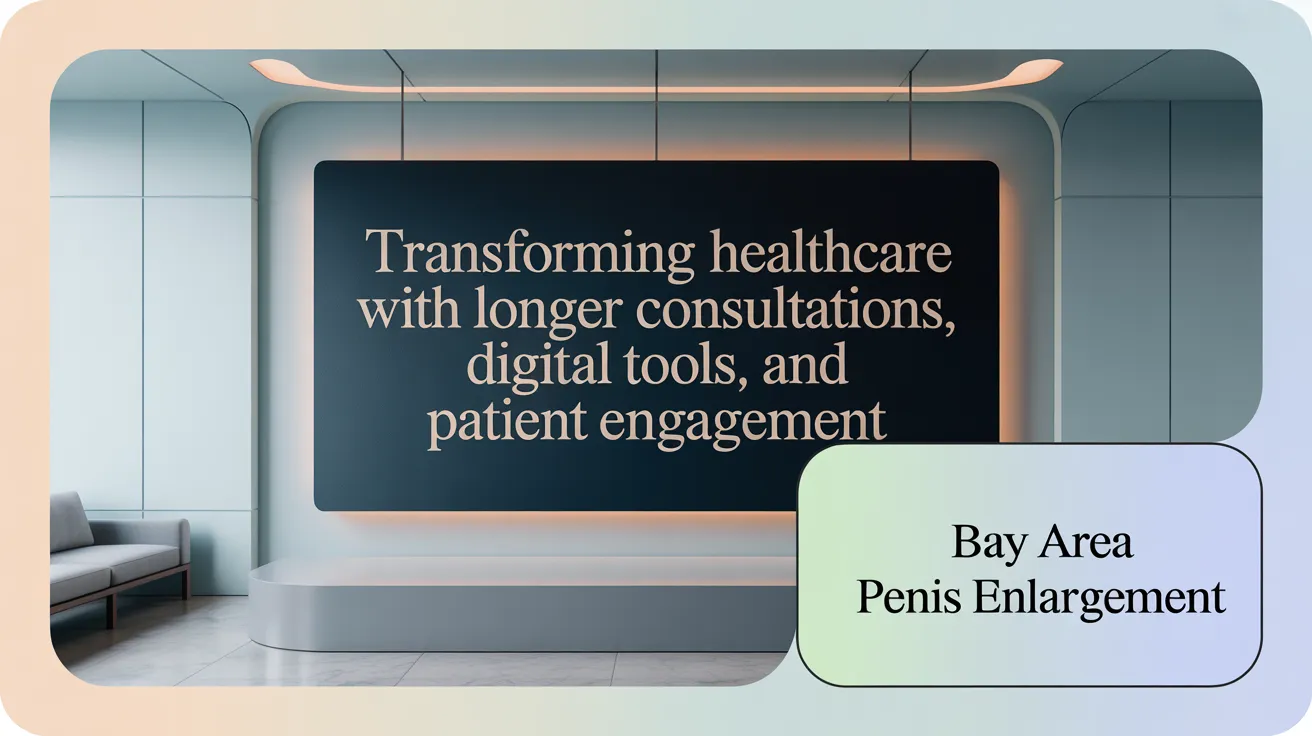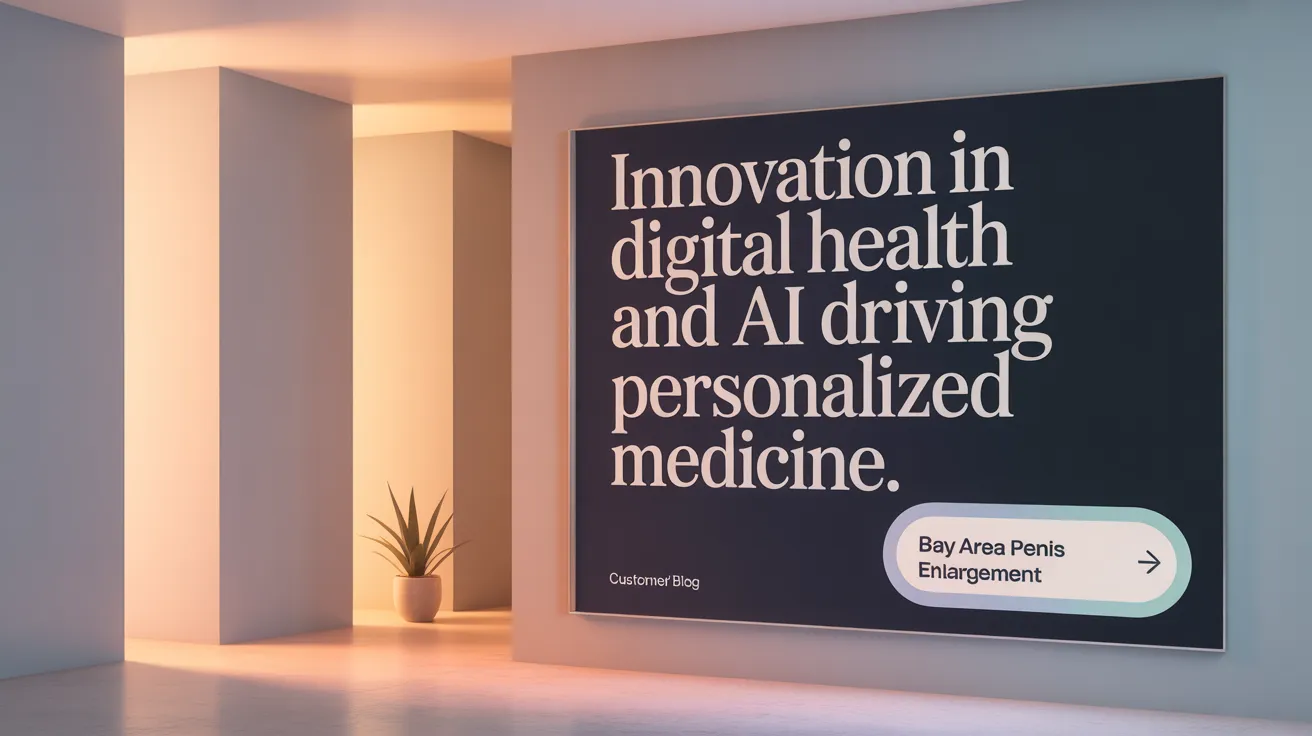Why Personalization in Healthcare Matters
Definition and Importance of Personalized Treatment Plans
Personalized treatment plans are healthcare strategies tailored to an individual's unique genetic makeup, lifestyle, and health profile. This approach addresses not only symptoms but also underlying causes, ensuring treatments are more effective and relevant to the patient's needs.
Overview of Improvements in Patient Outcomes and Satisfaction
Customized care has demonstrated significant improvements in health outcomes across various specialties, including oncology and chronic disease management. Studies show a 25% increase in survival rates in cancer patients with targeted therapies. Patients also report higher satisfaction, better engagement, and fewer complications when treatments are personalized.
Role of Genetics, Lifestyle, and Technology in Tailoring Treatments
Advances in genetic testing and health data analytics enable clinicians to identify mutations and risk factors, guiding precise therapy choices. Lifestyle factors such as diet and activity are incorporated for holistic care. Additionally, digital health tools and telemedicine support ongoing monitoring and real-time treatment adjustments, embodying the adaptive nature of personalized medicine.
The Science Behind Personalized Treatment Plans

How do personalized treatment plans integrate genetic and lifestyle factors to improve outcomes?
Personalized treatment plans leverage comprehensive genetic profiling alongside environmental and lifestyle information to tailor healthcare precisely to each individual. This integration allows clinicians to address both symptoms and root causes more effectively, enhancing treatment responses.
In oncology, for instance, genomic sequencing for disease mutation identification identifies specific tumor mutations, enabling targeted cancer therapy that have demonstrated up to a 25% improvement in improved survival rates with personalized treatment. Nearly half of cancer patients receiving such personalized therapies in oncology experience significant tumor reduction. These genetic insights, combined with advanced biomarkers, allow risk stratification and optimized therapy selection.
Similarly, precision medicine in male sexual health treatments now incorporate genetic and hormonal testing to improve diagnosis and treatment accuracy. Personalized plans consider genetic markers and sexual dysfunction and lifestyle factors, leading to customized regimens that enhance efficacy and minimize side effects. Innovations include refined diagnostic tests and new medications designed to match individual patient profiles.
Technological advancements, such as genetic testing in treatment planning and health data analytics for customized care, play a pivotal role in enabling these personalized approaches. They facilitate the identification of molecular targets and biomarkers critical for developing effective, patient-specific interventions. The use of digital tools for patient engagement and digitized health information further supports adaptive treatment modifications, improving long-term outcomes.
Overall, the science underpinning personalized medicine rests on a detailed understanding of genetic, environmental, and lifestyle interactions, paving the way for more precise, effective, and patient-centered healthcare.
Personalized Treatment in Male Sexual Health: Tailoring Care for Better Satisfaction

What personalized treatments are available for male sexual health issues?
Personalized treatments for male sexual health are diverse and meticulously tailored to each individual's genetic makeup, hormonal profile, and unique health history. Advanced diagnostics such as penile Doppler studies, genetic testing, and biomarker analysis enable clinicians to identify the underlying causes of erectile dysfunction (ED) and other sexual concerns, facilitating highly specific treatment plans (precision medicine in male sexual health).
Pharmacological interventions include testosterone replacement therapy (TRT) with novel delivery methods like nasal sprays and non-hepatotoxic oral formulations. Compounded medications, such as sublingual tablets and injections, are customized to optimize efficacy and reduce side effects. Low-intensity shockwave therapy promotes vascular regeneration, offering a regenerative option for ED patients (Personalized medicine for erectile dysfunction).
Surgical personalization is exemplified by the innovative tunica expansion technique, developed by Dr. Robert Valenzuela, enhancing penile girth and length while preserving prosthesis functionality. Penuma® implants—FDA-cleared silicone devices—offer cosmetic enhancement with minimal downtime and a focus on natural aesthetics.
Lifestyle modifications are incorporated alongside pharmacotherapy to address psychosocial and behavioral contributors to sexual health, ensuring a holistic approach (Sexual medicine services for men).
How does ongoing patient support improve outcomes?
Continuous follow-up and personalized adjustments are critical to maximize treatment success and patient satisfaction. Clinics provide dedicated practitioner access through direct communication channels, enabling real-time symptom monitoring, medication adjustments, and encouragement. Digital tools and telemedicine play an increasing role in sustaining patient engagement and adherence (Personalized patient experiences).
What combination of therapies is utilized?
Effective personalized care blends pharmacological therapies with lifestyle changes such as stress reduction, weight management, nutrition optimization, and counseling. Multidisciplinary care teams collaborate to address physical, psychological, and social determinants of male sexual health, employing targeted strategies tailored to each patient's profile and goals (Multidisciplinary care for male sexual health.
How does patient engagement benefit personalized treatments?
Engaged patients benefit from treatment plans aligned with their preferences and needs, leading to higher satisfaction and sustained improvements. Personalized care emphasizes education, open dialogue, and respect for patient autonomy, fostering trust and adherence. This patient-centered model improves outcomes by integrating medical, psychological, and lifestyle components into cohesive, customized treatment regimens (Improving patient experience through technology).
Enhancing Patient Experience through Personalized Care Models

Concierge Medicine and Longer, In-Depth Consultations
Concierge medicine offers a highly personalized healthcare approach, focusing on extended appointment times that typically surpass the brief consultations of traditional healthcare. These longer visits allow physicians to thoroughly explore patient concerns, develop customized treatment plans, and foster deeper doctor-patient relationships. Patients benefit from comprehensive discussions that encompass their genetics, lifestyle, and health history, supporting more accurate diagnoses and targeted therapies.
Direct Physician Access and Proactive Healthcare
A hallmark of personalized care models is the provision of direct access to physicians via calls, texts, or emails. This immediacy reduces the need for emergency visits and enables timely interventions. Moreover, proactive healthcare is emphasized through regular screenings and prevention strategies, prioritizing early detection and lifestyle modifications. Physicians typically manage smaller patient panels, ensuring individualized attention and stronger partnerships in managing health.
Digital Health Tools for Remote Monitoring and Engagement
Advanced digital tools, including telemedicine platforms, wearable devices, and real-time symptom trackers, enable continuous monitoring of patients outside of clinical settings. These technologies facilitate personalized outreach, behavioral tracking, and feedback, allowing healthcare providers to adjust treatment plans swiftly. Digital engagement also supports staff efficiency amid workforce shortages, automating routine patient interactions while maintaining personalized care quality.
Impact on Chronic Disease Management and Mental Health Support
Personalized care models improve management of chronic conditions such as diabetes and hypertension by integrating genetic, lifestyle, and environmental factors into treatment strategies. Mental health treatment benefits similarly through customized therapies and ongoing support, helping increase patient adherence and satisfaction. Collectively, these approaches reduce complications, enhance quality of life, and promote sustained behavioral change.
How does personalized care improve the overall patient experience and satisfaction?
Personalized care models enhance patient satisfaction by enabling longer, unrushed consultations and direct physician communication, which build trust and engagement. The incorporation of digital tools for remote monitoring improves adherence and facilitates timely adjustments, particularly in chronic disease and mental health management. This comprehensive, patient-centered approach results in fewer emergency visits, increased loyalty, and overall better health outcomes, making healthcare delivery more efficient and patient-friendly.
The Role of Multidisciplinary and Patient-Centered Approaches in Personalization

Integration of Specialists for Comprehensive Care
Personalized treatment in male health is enhanced through the collaboration of multidisciplinary teams, including urologists, endocrinologists, genetic counselors, sexologists, and mental health professionals. This integration ensures a thorough evaluation of physical symptoms, genetic and hormonal factors, as well as psychological and social influences on health (precision medicine in male sexual health, Multidisciplinary Care for Male Sexual Health, Mayo Clinic Multidisciplinary Stone Clinic).
Use of Patient-Reported Outcomes and Quality of Life Data
Incorporating patient-reported outcomes (PROs) and health-related quality of life (HRQoL) assessments into clinical practice provides crucial insights into the impact of treatment on daily life. Although subjective, this data aids clinicians in making more patient-centered decisions and tailoring care to patients’ individual experiences and needs (patient-centered care in urology, Personalized patient experiences.
Inclusion of Mental, Social, and Lifestyle Considerations
Effective personalized medicine extends beyond physical ailments by addressing mental health, social support, and lifestyle factors. By acknowledging these dimensions, care plans become more holistic, improving emotional well-being alongside physical health outcomes (Personalized healthcare approach, Mental health support, Improving patient experience through technology.
Importance of Communication and Continuous Monitoring
Ongoing communication between patient and healthcare providers, along with continuous behavioral monitoring, strengthens adherence and trust. Family involvement and regular feedback loops allow for timely adjustments, further improving satisfaction and treatment success (Feedback loops for enhanced care, Enhancing care outcomes, Ways Nurses Can Improve Patient Care).
Why is multidisciplinary and patient-centered care important for personalized treatment effectiveness?
Multidisciplinary teams provide comprehensive care addressing all facets of health, while use of patient-reported outcomes and quality of life data centers care on the individual's needs. Inclusion of mental, social, and lifestyle factors contributes to holistic treatment, enhancing well-being beyond traditional clinical parameters. Continuous monitoring and communication foster trust and adherence, ultimately resulting in improved treatment effectiveness and patient satisfaction (Personalized Care Benefits, Future of urology, Patient-centered hospital approaches.
Technology as a Catalyst for Personalized Medicine and Patient Satisfaction

How do technological advancements support personalized treatment plans to enhance patient satisfaction?
Technological innovations are transforming personalized medicine by providing healthcare professionals with advanced tools for precise diagnosis and targeted treatments. Artificial intelligence (AI) and health data analytics enable predictive modeling, allowing clinicians to anticipate patient needs and customize care effectively (Improving patient experience through technology.
Digital health tools, including patient portals and telemedicine platforms, enhance remote patient engagement and improve access to healthcare services (Telemedicine in Personalized Medicine; Digitally enabled personalized outreach. Automated outreach and symptom monitoring systems help maintain continuous communication, fostering better adherence to treatment plans and timely adjustments when necessary (Ongoing symptom monitoring.
These technologies facilitate preventive care through predictive analytics, enabling early intervention and reducing the risk of disease progression (Predictive and Preventive Medicine). Real-time data collection via IoT devices and mobile health applications supports adaptive care models responsive to individual patient conditions (Mayo Clinic IoT patient monitoring.
Operationally, integrating digital tools streamlines scheduling, billing, and record management, improving convenience for patients and reducing administrative burdens for providers (Hospital management platforms. Economically, personalized approaches driven by technology decrease unnecessary interventions and hospital visits, optimizing resource utilization and lowering healthcare costs (Economic Benefits of Personalized Care).
In summary, advances in AI, digital health, and data analytics not only enhance the precision of personalized treatment plans but also improve patient satisfaction by providing accessible, responsive, and efficient care experiences (Technology in Personalized Healthcare.

